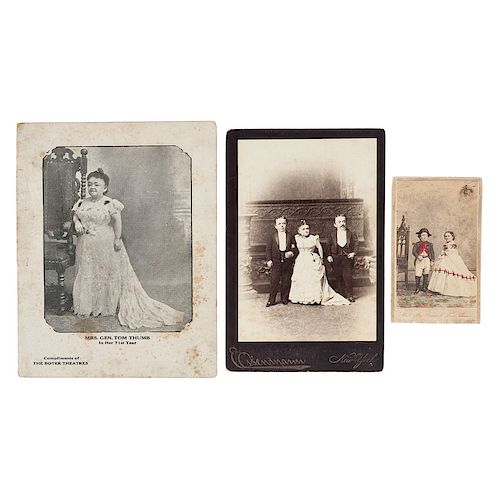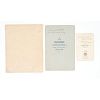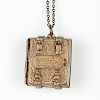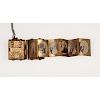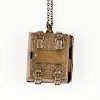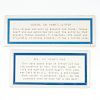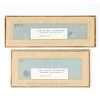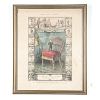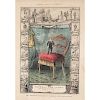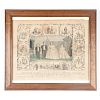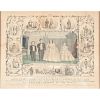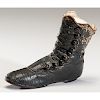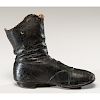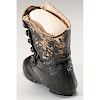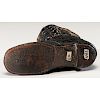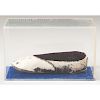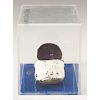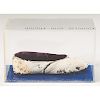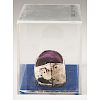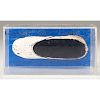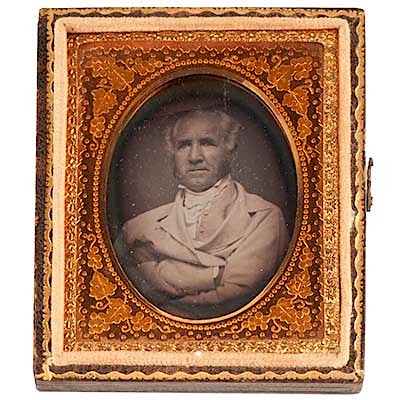Tom and Lavinia Thumb Collection, Featuring Their Shoes
About Seller
6270 Este Ave.
Cincinnati , OH 45232
United States
With offices in Cincinnati, Cleveland and Denver, Cowan’s holds over 40 auctions each year, with annual sales exceeding $16M. We reach buyers around the globe, and take pride in our reputation for integrity, customer service and great results. A full-service house, Cowan’s Auctions specializes in Am...Read more
Two ways to bid:
- Leave a max absentee bid and the platform will bid on your behalf up to your maximum bid during the live auction.
- Bid live during the auction and your bids will be submitted real-time to the auctioneer.
Bid Increments
| Price | Bid Increment |
|---|---|
| $0 | $25 |
| $500 | $50 |
| $1,000 | $100 |
| $2,000 | $250 |
| $5,000 | $500 |
| $10,000 | $1,000 |
| $20,000 | $2,500 |
| $50,000 | $5,000 |
| $100,000 | $10,000 |
About Auction
Nov 16, 2018
Cowan’s Fall American History: Premier Auction features over 200 lots including early photographs, documents, manuscripts, broadsides, flags, and more dating from the Revolutionary War period to the mid-20th Century, many representing important landmark moments in American history. Cowan's Auctions dawnie@cowans.com
- Lot Description
Lot of 8 items, including:
Tom Thumb's slipper. The upper was originally bronze kidskin. In unopened 3.5 x 4 x 7 in. plexiglass display case.
Mrs. Tom Thumb's shoe. Hand-sewn 9-button shoe of French kid.
Locket in book form with accordion-folded brass panels containing 12 gem-sized prints of Mr. and Mrs. Tom Thumb. Most are classic views taken around the time of their wedding. Front of the "book" with "Somebody's Luggage." Approx. 0.75 x 1 in. on 17 in. chain.
Hand-tinted CDV of Mr. & Mrs. Tom Thumb, he in a "Napoleonic" uniform.
Cabinet card of Count Magri, Lavinia, and Baron Magri. Verso with later manuscript ID stating "Admiral Dot & Tom Thumb & Wife," but Lavinia is clearly older, and this pose matches others with photographer's ID of Lavinia's second husband, Count Primo Magri and his brother, Guiseppe.
Advertising card, 5.25 x 7 in., with "Mrs. Gen. Tom Thumb / In Her 71st Year...Compliments of the Boyer Theatres."
Currier & Ives broadside depicting the wedding of the Thumbs "at Grace Church, N.Y. Feb: 10th, 1863," with vignettes of the couple and their friends: Tom Thumb as Napoleon; Tom Thumb in Court Dress; Tom Thumb and Wife in Street dress; Commodore Nutt as Yankee-boy; General as Highlander; Minnie [Warren] in Reception dress; Nutt in military; "Splendid equipage of Gen. Tom Thumb & Suite, Cost over $2000" under image of horse-drawn carriage; Commodore Nutt as Drummer-boy; and Mrs. General in National Dress. Framed, 11.5 x 14.5 in. (sight).
Second Currier broadside depicts Tom Thumb only in some of his many acting roles. Central vignette shows him standing atop a chair, hand-colored. In top margin: "Barnum's Gallery of Wonders, No. 1." Along left, Thumb as: Napoleon, Highlander, Cain, Gladiator, Hercules, Cupid. Along right: American Tar, Yankee, Ajax, Romulus, Samson, and second Cupid. Bottom cartouche with: "General Tom Thumb. Born in 1832 is 28 inches High and Weighs only 15 Pounds. From a Daguerreotype by Plumbe." Copyrighted by Currier in 1849. Framed, 12.5 x 15.5 in (sight).
Charles Sherwood Stratton (1838-1883) was born in Bridgeport Connecticut. His parents were first cousins and his grandmothers were twins. He was large as a baby, weighing 9.5 pounds. He developed normally for the first six months, then stopped growing. Over the next four years he would grow only one inch.
Phineas T. Barnum, a (very) distant relative heard about Charles and contacted his parents. Barnum then took over the boy's training, teaching him to sing, dance, mime, act, etc. When Stratton was five, Barnum took him on the road, with Stratton impersonating Napoleon, Cupid, and other figures. It was a success. Barnum expanded the tour taking Stratton to Europe where he played before Queen Victoria twice, and in theaters in France and elsewhere. Soon he was one of the most popular celebrities of the day. In addition, this helped popularize (and in a sense, legitimize) "freak shows," which had been seen as unpleasant forms of entertainment. But Stratton, and later other small people, were actors, sometimes performing in shows written especially for them, not mere curiosities.
In 1863 he married Lavinia Warren. The wedding was held at Grace Episcopal Church and the reception at the Metropolitan Hotel (New York). The best man was George Washington Morrison ("Commodore") Nutt and the maid of honor was Lavinia's sister, Minnie. President Lincoln received the couple at the White House after the wedding.
Although some might criticize Barnum for his exploitation of these little people, many, including Thumb and Nutt, became fairly wealthy. The Thumbs had a New York home, a steam yacht, a specially adapted vacation home, and a large wardrobe. Stratton at one point had to bail Barnum out of financial trouble. It was a legitimate career for a person who could have been marginalized by society.
Charles Stratton died of a stroke at the age of only 45. The funeral was attended by over 20,000 people. Barnum had a life-sized statue of Thumb made as a grave stone. When Lavinia died, she was buried next to him with a stone that simply said "His Wife."
A couple years after Stratton's death, Lavinia found herself a bit short of resources, having spent most of the couple's income on a lavish lifestyle. So she married Italian midget "Count" Primo Magri, and, along with his brother, formed an opera company and hit the road as performers again. As they aged, their popularity fell (and social tastes were changing). They gave up, returned to Middleboro, Massachusetts, Lavinia's home town, and opened an ice cream shop.
Both broadsides with toning. Not removed from frames for examination. Earlier broadside has scattered foxing and a small hole in the upper left margin, not impacting any text or images. Advertising card with some short margin tears.Condition
- Shipping Info
-
Buyers are required to pay for all packing, shipping and insurance charges. Overseas duty charges are the responsibility of the successful Bidder. Be aware that for larger and/or valuable items, shipping charges can be substantial. - If there is no shipping amount on listed your invoice, you will need to make arrangements to pick up or ship your purchase through an alternative shipping company. Our shipping department can be contacted at 513.871.1670 (ext. 219) or email shipping@cowans.com. - Shipping charges include insurance for your order while in transit. If you have private insurance we will adjust your charge to include only packing and shipping. - Please allow 14 – 21 days after payment to package and ship your purchase as carefully as possible.
-
- Buyer's Premium



 EUR
EUR CAD
CAD AUD
AUD GBP
GBP MXN
MXN HKD
HKD CNY
CNY MYR
MYR SEK
SEK SGD
SGD CHF
CHF THB
THB